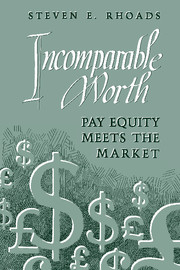Book contents
- Frontmatter
- Contents
- Acknowledgments
- 1 Introduction
- 2 The debate over equal pay for comparable worth
- 3 Implementing comparable worth in Minnesota
- 4 Job evaluation in Minnesota localities
- 5 Equal pay for work of equal value in the European Community
- 6 Equal pay for work of equal value in the United Kingdom
- 7 Equal pay for work of equal value in Australia
- 8 Conclusion
- Appendix: a note on the research and presentation of findings
- Notes
- Index
6 - Equal pay for work of equal value in the United Kingdom
Published online by Cambridge University Press: 06 July 2010
- Frontmatter
- Contents
- Acknowledgments
- 1 Introduction
- 2 The debate over equal pay for comparable worth
- 3 Implementing comparable worth in Minnesota
- 4 Job evaluation in Minnesota localities
- 5 Equal pay for work of equal value in the European Community
- 6 Equal pay for work of equal value in the United Kingdom
- 7 Equal pay for work of equal value in Australia
- 8 Conclusion
- Appendix: a note on the research and presentation of findings
- Notes
- Index
Summary
THE U.K. EQUAL-VALUE LAW AND THE TRIBUNAL SYSTEM
As explained in Chapter 5, the United Kingdom experience should be of most interest to those who would look to European Community (EC) developments for indications of how a comparable-worth system might work in the United States. This single country has provided more than half of all the equal-value legal cases generated in the Community as a whole; it shares with the United States an adversarial, common-law-based legal system; and it has adopted a firm-centered approach to implementation. Further, unlike Minnesota, Britain applies the law to the private sector.
As in Minnesota, the U.K. experience has been marked by an absence of objective or even agreed-upon criteria for job evaluation and by much wrangling over the relative value of diverse jobs. The process has produced arbitrary and inefficient outcomes, including, once again, a legal requirement that certain employers pay their employees different wages for similar jobs.
The original U.K. Equal Pay Act of 1970 came into full force at the end of 1975. The act required that women (and men) receive equal contractual treatment where they did the same or “broadly similar” work or work that had been given an equal value through job evaluation. Employers were not required to conduct job evaluations if none existed.
From 1970 to 1977 the average weekly earnings of women climbed from 54 percent of men's to 65 percent. For much of this period, an active government incomes policy meant to control wage and price inflation provided for flat-rate pay increases, thus compressing skill differentials.
- Type
- Chapter
- Information
- Incomparable WorthPay Equity Meets the Market, pp. 148 - 178Publisher: Cambridge University PressPrint publication year: 1993

